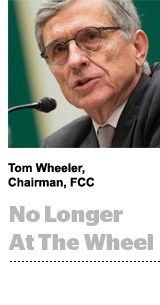 As expected, Tom Wheeler will leave his post as FCC chairman on inauguration day and his legacy looks shaky.
As expected, Tom Wheeler will leave his post as FCC chairman on inauguration day and his legacy looks shaky.
Likely on the chopping block in a Republican-majority FCC are the commission’s recently ratified ISP privacy rules and a reclassification of broadband providers as common carriers, seen by many as an encroachment on the Federal Trade Commission’s turf.
Wheeler’s initiative to encourage more competition among cable set-top box providers is already dead in the water. And net neutrality, which requires ISPs to treat all internet traffic as equal regardless of the source, presumably is also not long for this world.
Republican FCC Commissioner Ajit Pai used somewhat colorful language to describe what life will be like at the commission when Trump is president.
“The regulatory underbrush at the FCC is thick,” Pai said in speech last week addressing a conservative think tank in Washington, DC. “We need to fire up the weed whacker and remove those rules that are holding back investment, innovation and job creation.”
Trump’s FCC transition team is populated by parties none too friendly to net neutrality regulations, including Jeffrey Eisenach, a consultant with close ties to Verizon. (Granted, Wheeler was himself a cable industry lobbyist before joining the FCC and turning into a champion for net neutrality.)
“Most of the public and many of their representatives support the concept of net neutrality, but there are difference in how a Republican controlled FCC and Congress might implement it,” said Jason Kint, CEO of publisher trader organization Digital Content Next. “The FCC put this in place in 2015 and more recently supported it with consumer privacy rules to rebuild trust, so it’s fairly unclear what is broken and requires a fix.”
When Wheeler departs on Jan. 20, however, it’s certain that soon-to-be President Trump will appoint a Republican chairman.
And there’s little doubt that net neutrality, a political hot button, will hit the cutting room floor, at least in its current form, said Corey Preston, senior product specialist at HTML5 ad builder company Adcade.
“Under President Trump, partisan anti-regulation fervor will, for lack of a better word, trump the hard-won gains in data equality,” he said.
But what does that mean for digital advertisers and media buyers?
Well, quite a lot, Preston said – especially in a world where telcos control the pipes and increasingly control the content. The AT&T/Time Warner merger looms large.
“ISPs have long been competing for the same media distribution leveraged by traditional digital advertisers,” Preston said. “With the elimination of net neutrality, ISPs will be granted authority over the ad delivery speed of competitors, which presents obvious conflicts of interest. And on the programmatic media side, prioritization at the ISP level will be fair game for favoring their own properties.”
Consider a video-focused ad company like Tremor or BrightRoll being subject to the same last-mile connect fees as Netflix, Hulu and other entertainment behemoths, Preston said.
“In an industry that delivers ads in milliseconds, speed of delivery will have direct effects on their ability to generate the double-digit growth they’ve enjoyed,” he said.
In theory, if there were a fast lane for internet traffic, big brands and businesses would also have an advantage over SMBs and mom-and-pop shops running ads because they could pay more to ensure better delivery of their content.
By the same token, if some advertising content loads too slowly, that would affect performance and conversions, which could lead to lower overall ROI and ad spend in the long term.
But nothing is going to change in the very short term. As of Dec. 7, the FCC has been deadlocked 2-2 following the Senate’s refusal to reconfirm Democratic FCC Commissioner Jessica Rosenworcel.
Travis LeBlanc, the FCC’s enforcement bureau chief, is also most likely on his way out. As he recently put it to AdExchanger: “I serve at the pleasure of the commission, but I’m appointed by the chairman. I was appointed by Chairman Wheeler [and] I can serve with relative certainty for so long as Chairman Wheeler is chairman of the FCC. But after that, all bets are off.”
The commission is populated by Republican Commissioners Pai and Michael O’Reilly, Democratic Commissioner Mignon Clyburn and Wheeler – for the month, at least.
This post was syndicated from Ad Exchanger.

More Stories
WBD Introduces Out-of-Home Member Plan as It Begins Max Password Crackdown
Deep Blue Is Building a Women’s Sports Yacht Club at Cannes
Sinclair SVP of Station Operations to Retire in June